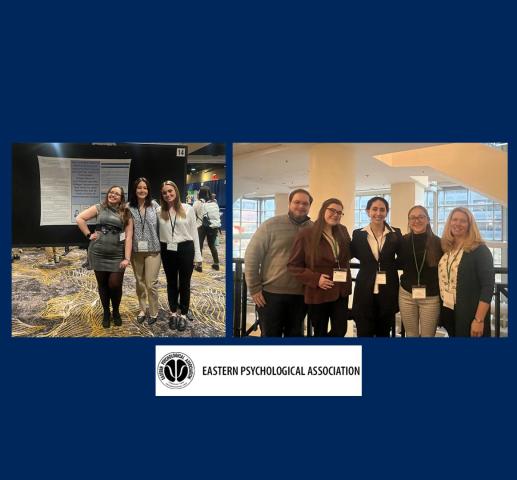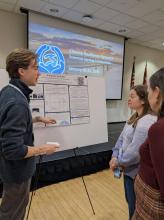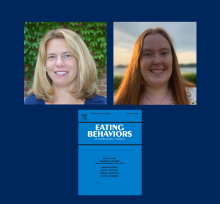
Psychology majors Raina Crew ‘24, Giselle Harris '25, Sadiyyah Holsey '25, Ashley Johnson '25 and Greta Michels '24; alums Mackenzie Brooks ‘22, Nicolette Iacona '23; and Associate Professor of Psychology Jennifer Tickle, Assistant Professor of Psychology Anandi Ehman and former SMCM Visiting Assistant Professor of Economics Josh Kaisen presented research at the Annual Meeting of the Eastern Psychological Association in early March 2024. The first author listed led the presentations except in the case of the third poster listed where the leader is designated with an asterisk.
Michels, Crew and Ehman presented on a directed-research-based project "Differences in Sexual Coercion & Assault Among Heterosexual & SGM Individuals." Sexual & gender minorities (SGMs) endure more experiences of sexual assault than non-SGMs. Data are lacking regarding parallel rates of sexual coercion. Authors hypothesized that SGM participants would endure higher rates of sexual coercion & assault than non-SGMs. Participants self-reported their experiences of sexual coercion & assault. SGMs reported more experiences of sexual assault and sexual coercion than non-SGMs [Coercion t(261.38) = -3.26, p
= .001); Assault t(258.85) = -2.01, p = .046)].
Crew, Michels and Ehman presented a directed-research-based project entitled "Did He Try to Prevent It? Differential Attitudes Towards Sexual Assault Victims." Research on bystander intervention, a prevention method for sexual assault, shows that males are predominantly less likely to intervene as a bystander in a sexual assault than females. The authors wanted to examine the role of sexual and gender identity as a potential variable in bystanders’ willingness to intervene in an instance of a hypothetical heterosexual sexual assault scenario for both a female and male victim. No statistical difference was found for bystanders’ willingness to help female victims (t(128) = .547, p = .586); male and female participants were equally likely to intervene in a scenario involving a male victim. Cis-males were less likely to intervene in the case of female sexual assault than sexual & gender minority individuals (female, non-binary, transgender) (t(133) = -4.58, p= .001).
Holsey, Johnson, and Ehman* presented a directed-research-based project entitled "Revealing the Digital Mask: The Dark Triad, Greek Life, Gender, and Sexuality in the Cyberbullying Landscape." This study explored the potential link between dark triad personality traits (specifically, psychopathy and Machiavellianism) and cyberbullying perpetration and victimization. Other variables observed included gender, sexual orientation and affiliation with Greek life. The study hypothesized cyberbullying would be positively correlated with Machiavellianism, psychopathy, and Greek life and inversely correlated with gender minority status. A significant positive correlation was found between victimization and observing perpetration among LGBTQ+ respondents; implications and potential explanations will be explored.
Harris, Tickle and Kaisen presented "Social Pressures in Risky Choice: Conformity and Fairness." The research project, partially funded by a SMCM faculty development grant, was a followup to the 2022 SMCM first-place student project in the Women’s Institute for a Secure Retirement (WISER) iOme Challenge national student essay competition and had many undergraduate research assistants from both economics and psychology involved in data collection. The current retirement crisis has led to most people saving far less for retirement than they will need. Although social nudges in the form of information about others' higher investment behavior can increase investing, low income workers tend to show a boomerang effect where they respond to a social nudge opposite the expected behavior by investing less. This study experimentally examined the boomerang effect in investment decisions of college students to directly test the negative effect of perceived unfairness on conformity in risky decisions. We presented participants with multiple gambles varying participant endowment, peer endowment, peer wagers, and gamble type. When participants had a low but fair endowment, they responded similarly to others and invested more than when they had no information. However, when participants had a low, unfair endowment (less than their peers), they responded in line with the boomerang effect investing less than expected. This effect was particularly strong for those with low need to belong and low household earnings. For participants given a high and fair endowment, they again followed the social nudge to invest more than when they had no information, but when they had a high endowment that was unfair (they were allocated more than their peers), they risked less than expected, particularly among females. These results have implications for policies targeting retirement savings which should take advantage of social nudges while not engaging the boomerang effect.
Iacona and Tickle presented “The Effects of Virtual Reality and Art Therapy on Stress Reduction" based on work conducted as part of Iacona's St. Mary's Project. Few studies have investigated the combined treatment of art therapy and virtual reality (VR) to reduce stress. This 2 x 2 x 2 mixed factorial experiment examined how media (VR vs traditional) and activity type (sculpting vs coloring) influenced stress levels in college students after engaging in a 10-minute artmaking activity. In general, results showed that engaging in artmaking, regardless of media format or art type, led to decreases in negative affect and increases in cognitive, physiological, and physical relaxation. However, the anticipated interaction that VR sculpting would show the largest effects because it combines immersive and haptic characteristics was not supported. The findings suggest that even short artmaking activities could be used in college settings and possibly more traditional therapeutic settings to assist with stress reduction and relaxation.
Brooks and Tickle presented "The Experience of and Uses of Autonomous Sensory Meridian Response" based on work that started as directed research but has continued post-graduation. Autonomous sensory meridian response (ASMR) is a pleasant, tingling sensation that generally starts from the top of the head and radiates through the rest of the body inducing a relaxation response. This survey research examined participants’ experience of ASMR, their use of online communities, the effect of life events such as COVID and entering college on ASMR practice, and individuals' use of ASMR as an aid for ADHD in a sample of college students. Results showed that, compared to other samples in the past five years, motivations for ASMR and types of triggers used have not substantially changed. ASMR practice in this sample did not change at times of transition such as upon matriculation to college or during the pandemic. Some participants reported using ASMR to reduce short- and long-term symptoms of ADHD. Less than 20% regularly connected with ASMR communities online, but those who did found acceptance and belonging in those communities.
As an added bonus, the group presenting posters with Tickle ran into Lynx Gabinet-Bethoulle '22 who was presenting research from his current graduate program in psychology at Villanova University.
Finally, Tickle also organized and led the Psychology Department Chair Roundtable alongside Amy Silvestri Hunter (Seton Hall University). Past or current members of the Association of Heads of Departments of Psychology annually host this informational roundtable discussion to provide an opportunity for current, past and future chairs to discuss common concerns, troubleshoot emerging issues and provide insight and information those who may be taking on the role of department chair in the near future. The roundtable began with the co-hosts providing advice for chairs and then progressed to an interactive discussion of questions and comments by the presenters and attendees.



